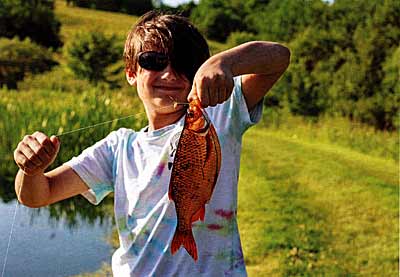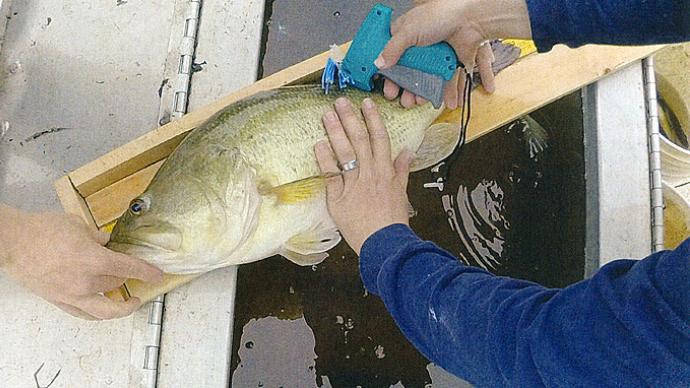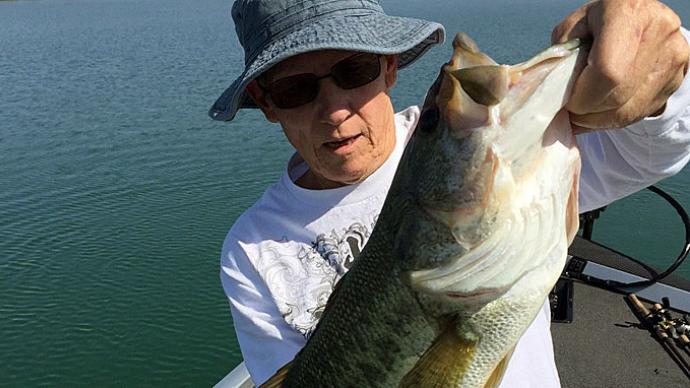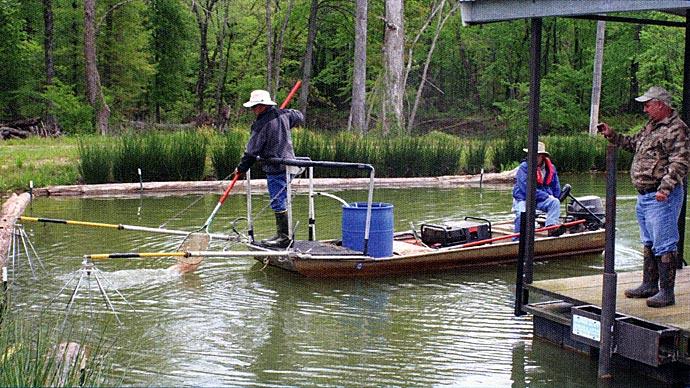
When thinking about the fish in a pond, many pond owners tend to put each species in a box and label them as strictly predator or prey. When this happens, the size and biology of the fish is neglected, and that may make always an incorrect assumption.
It all depends.
Let's start with something easy. The fathead minnow is everyone's favorite starter baitfish. Fatheads are small baitfish that rarely grow larger than 3" and are often the first forage fish stocked in a pond to give the newly stocked predators a jumpstart. Fathead minnows generally prefer to eat large plankton and small insect larvae. In many cases, fatheads are a cold-hardy mosquito biocontrol in areas that are too cold for real Gambusia mosquitofish. Sometimes fatheads can even live on detritus (dead organic material) if they have to. Fatheads are prey fish and rightly so. Everything under the sun from frogs to dragonfly nymphs to other preyfish and small predators like to eat fatheads. They hang out in shallow water and are absolutely hammered by all shallow water predators. In bass ponds, fatheads are expected to give the bass a quick start, and then disappear in a few short years. Live fast, die hard—and young.
How about golden shiners? They are considered a prey fish, right? Not so fast. Golden shiners prefer to eat large zooplankton and insect larvae. But they can be opportunist predators of small ichthyoplankton if they get the chance. Ichthyoplankton are small baby fish that may drift at or near the surface for a period of time after they hatch. During this time even a mighty predator like a walleye spends time as a drifting, helpless ichthyoplankton. Will a shiner eat a larval walleye? Yep! Along with every other fish that eats plankton in the water column. Anything floating around in the water column will be fair game.
What about European Rudd? Many people have stocked Rudd in their ponds as a fancy, shiner-like baitfish. Rudd might be even a little more likely to eat small ichthyoplankton. How do I know? Well, I fish for them! Some of the best big catfish bait is a lively large shiner or Rudd. And in fisheries class here at SUNY Cobleskill, I often pump the stomach of these fish to take a look at what they are eating. Big Rudd and shiners eat ichthyoplankton. They are predators, limited by mouth size.
Sometimes there is a fine line between predator and prey. This week, while fishing with my son, we caught a really nice black crappie. When he hooked it and it took out drag, I thought that he had a bass on the line. But when he brought it to the net, it turned
into a really nice 14" black crappie. A large crappie is a good example of a fish that will turn into a predator with size. The crappie will spend most of its early life eating crustacean zooplankton, insect larvae and other small pond tidbits. But bigger crappie will eat fish, and lots of them. One of my favorite things to do after I catch a mess of crappie in the winter (ice fishing) is to look at the stomach contents of those big slabs. Most of the time, the bigger fish will have other fish in their stomachs. What kind of baitfish are in those stomachs? Generally, Largemouth bass!! What? Yes, young of the year Largemouth bass are found in most of the crappie stomachs I catch ice fishing.
Are Largemouth bass always a predator? Yes, but when they are small, they are prey. What eats baby Largemouth bass? Almost everything will eat them when the bass are small fry, and unprotected. That includes crappie and bluegill. What? Bluegill will eat bass? Yes, they sure will. When a bass is pulled from the nest in waters dominated by bluegill, bluegill will zoom in and scarf up all the baby bass fry. This, to me, is why the Largemouth bass-bluegill relationship is so interesting. In all ponds it's quite difficult to find mutual balance between bass and bluegill. Either bass are dominant, and there are just a few big bluegills with low recruitment of small bluegill (they all get eaten), or bluegill dominate, limiting recruitment of the largemouth. I know a few ponds with a billion small bluegill all hovering around a few bass nests with hungry eyes. Those bass fry are toast. Yes, bluegill are predators.
What about yellow perch? In many instances perch are great prey fish. Small young of the year perch are great forage for walleye, largemouth, and smallmouth bass. In complex ponds, big perch can be big predators. Some of the biggest perch I catch fishing are on large minnows that I would fish for bass. Big perch cruise the weed edges foraging on minnows, shiners, small bass, and baby bluegill. One of the best lures for large yellow perch is a jig that resembles a young of the year bluegill. Big perch can
be big predators. If growing largemouth or smallmouth is your game, you may want to consider a perch as a competitor for the forage fish resources in your pond.
One lesson I learned the hard way is that many fish also eat baby walleye. For 15 years we stocked a local lake with eighty-thousand pond fingerling (1.5-2.0") walleye (at .33 cent each) to re-establish a fishery. Immediately after stocking the walleye each year, I caught all the predators I could find and pumped theirs stomach. My walleye were being eaten in droves by largemouth bass, smallmouth bass, chain pickerel, rock bass and yellow perch. Some of these predators had dozens of walleyes in their guts. I remember one bass had 19 walleyes in its stomach. Interestingly, bluegills also ate a few of these walleyes.
What about trout? Are trout fish predators? Yes, they sure are. Brook trout would like to be mostly insectivorous most of the time. Sure, they may take a minnow, but most of their diet consists of insects. That's also true of small brown trout. But once a brown trout reaches a larger size (>12"), its diet can switch over to fish if available. A large brown trout is a piscivore and it's a cannibal to boot. Some of the best fishing lures in my arsenal for big brown trout mimic small rainbow trout. And, sometimes I fish for them at night, on the surface with topwater, just like I was fishing for bass.
So, predator or prey? Sometimes its not as simple as saying all bass are predators. Until they are larger, those small bass are likely prey. They need to be. Otherwise, we'd end up with way too many of those fish without a way for them to seek any semblance of balance. And, this is true of most small fish, no matter what they turn into. Big fish eat little fish, if they can find them, catch them, and subdue them.
Small fish in your pond, no matter the species, are on the menu.
Mark Cornwell is professor of fisheries at State University of New York in Cobleskill, NY. Based near the Catskill foothills, he feeds the brains of hungry fish students, offering plenty of applied science and handson opportunities beyond the classroom. Cornwell also works with select local landowners, collecting data, analyzing ponds, with students receiving the benefit as well. He also assists the college's aquaculture department.
Reprinted with permission from Pond Boss Magazine



